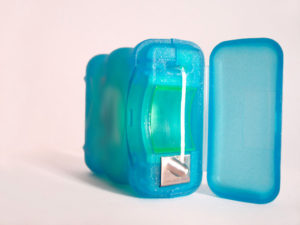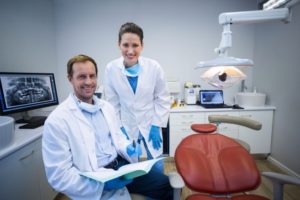Dentist in Vienna
 Most serious oral health issues can be prevented by maintaining an effective routine of dental hygiene and in-office care. However, you could be at higher risk for some oral illnesses due to hereditary factors. Awareness and proper treatment can help minimize these risks. Here are a few of the most common oral health concerns that are affected by genetics.
Most serious oral health issues can be prevented by maintaining an effective routine of dental hygiene and in-office care. However, you could be at higher risk for some oral illnesses due to hereditary factors. Awareness and proper treatment can help minimize these risks. Here are a few of the most common oral health concerns that are affected by genetics.
Tooth decay – One of the most common oral issues, some tooth decay has been linked to a genetic deficiency of a protein called DEFB1. If your parents experienced an unusually high rate of tooth decay, then you may want to be more vigilant regarding your own dental care.
Oral cancer – Certain genetic factors can increase your risk of developing oral cancer. Our doctor recommends annual oral cancer screening for early identification and treatment. In addition, certain lifestyle choices, such as quitting smoking and limiting alcohol consumption, can help reduce your risk of oral cancer.
Periodontal disease – Recent research has found that some forms of gum disease may be linked to mutations in genes that affect immunity and inflammatory response.
Misaligned or supernumerary (extra) teeth – Genetics can play a role in having misaligned or even extra teeth. The size of your jaw is determined mostly through heredity, and is the most common reason for an overbite, underbite, or dental crowding.
Canker sores – In most cases, canker sores are an isolated reaction to fatigue, stress, or menstrual cycles. However, there are certain inherited diseases that count canker sores among their symptoms. Crohn’s disease and Celiac sprue are two such conditions.
While you may not be able to avoid hereditary oral health issues entirely, we can help minimize or even reverse their effects with proper treatment and care. If you suffer from any of these inherited conditions, contact our office for an oral health evaluation. We can help.
2563 Chain Bridge Rd.
Vienna, VA 22181
(703) 281-0902

 Chipping a tooth could be uncomfortable and embarrassing. Fortunately, there are a number of ways to fix a chipped tooth. We will recommend a solution based on your particular needs. Here are three options we may provide you:
Chipping a tooth could be uncomfortable and embarrassing. Fortunately, there are a number of ways to fix a chipped tooth. We will recommend a solution based on your particular needs. Here are three options we may provide you: Oral cancer does not discriminate. It affects those of all ages, genders and races. Smokers do develop oral cancers at higher rates than non-smokers. However, this does not absolve the rest of the population from being at risk, as well.
Oral cancer does not discriminate. It affects those of all ages, genders and races. Smokers do develop oral cancers at higher rates than non-smokers. However, this does not absolve the rest of the population from being at risk, as well. Do you have white spots on your teeth? Are your teeth quite sensitive? Do your teeth have cracks, chips, or indentations? If yes, then you may be experiencing enamel erosion.
Do you have white spots on your teeth? Are your teeth quite sensitive? Do your teeth have cracks, chips, or indentations? If yes, then you may be experiencing enamel erosion. Do you brush your teeth after lunch? If you’re one of the millions of people who work outside the home, chances are you don’t have the time or resources to brush during the day. However, not being able to brush doesn’t mean you can’t protect your teeth at work.
Do you brush your teeth after lunch? If you’re one of the millions of people who work outside the home, chances are you don’t have the time or resources to brush during the day. However, not being able to brush doesn’t mean you can’t protect your teeth at work. Loose teeth, bad breath, and painful, bloody gums – these are among the signs and symptoms of periodontal, or gum, disease. Unfortunately, periodontal disease can also begin without any obvious symptoms. If left undiagnosed or untreated, you could be at risk for irreparable damage to your teeth and gums. The good news is that periodontal disease is preventable. In fact, one of the most effective tools for preventing the disease only takes a minute of your time each day.
Loose teeth, bad breath, and painful, bloody gums – these are among the signs and symptoms of periodontal, or gum, disease. Unfortunately, periodontal disease can also begin without any obvious symptoms. If left undiagnosed or untreated, you could be at risk for irreparable damage to your teeth and gums. The good news is that periodontal disease is preventable. In fact, one of the most effective tools for preventing the disease only takes a minute of your time each day. Your smile is one of the first things a person will notice when you meet. If you would like to improve your smile with a simple procedure, teeth whitening may be a great option for you, especially if you have stained, dull or discolored teeth. Our dental office is providing teeth whitening services to new and existing patients.
Your smile is one of the first things a person will notice when you meet. If you would like to improve your smile with a simple procedure, teeth whitening may be a great option for you, especially if you have stained, dull or discolored teeth. Our dental office is providing teeth whitening services to new and existing patients. It can be difficult to get your child to practice proper oral care unsupervised. However, the long-term benefits of an early start to optimal oral hygiene are worth the effort. Below are some tips to help you make oral health a fun part of your child’s daily routine.
It can be difficult to get your child to practice proper oral care unsupervised. However, the long-term benefits of an early start to optimal oral hygiene are worth the effort. Below are some tips to help you make oral health a fun part of your child’s daily routine. It’s highly likely that after visiting our practice, you understand the value of a thorough, professional dental cleaning. It’s also likely that you may not fully understand the importance of a complete exam and radiographs.
It’s highly likely that after visiting our practice, you understand the value of a thorough, professional dental cleaning. It’s also likely that you may not fully understand the importance of a complete exam and radiographs.